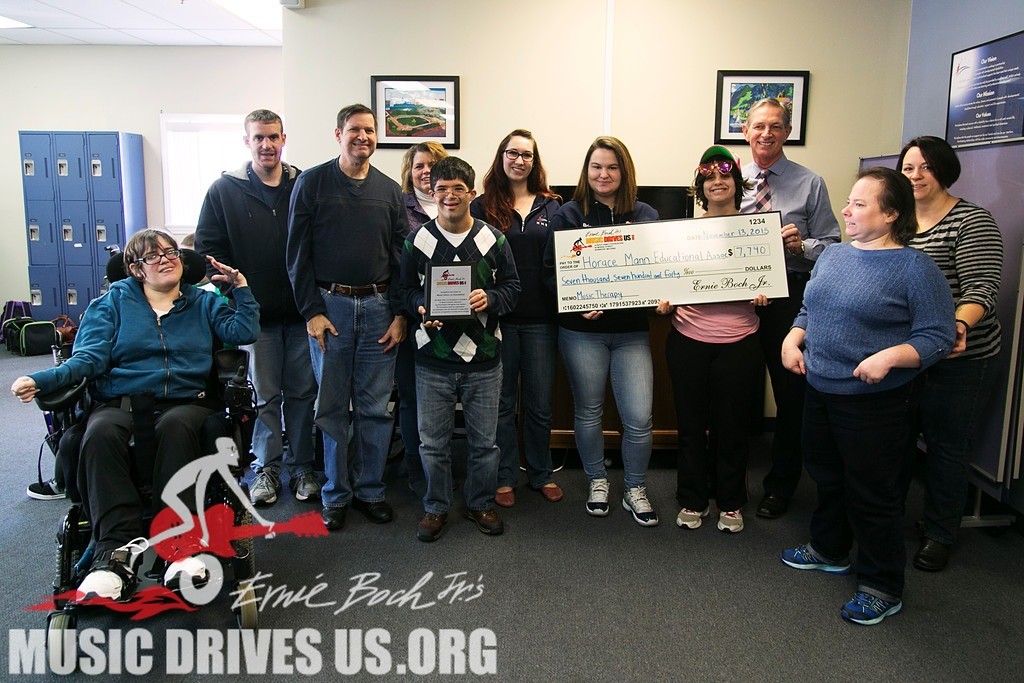Horace Mann Educational Associates, HMEA, in Franklin, MA supports children and adults with developmental disabilities to over 110 communities within Massachusetts, providing innovative services in school, at home, at work and in the community. Music therapy programs were included among the programs HMEA provided, and the programs had a great reception from the community. Unfortunately, when funding ran out, the program was stopped.
Douglas MacPherson, the Vice President of Development and Public Relations for HMEA, knew that music therapy programs were needed by the community and he wanted to find a way to continue to offer music therapy programs.
Funding search
And find a way he did. First, Mr MacPherson and his team applied to the Music Drives Us Foundation out of Dedham, founded by Ernie Boch Jr., a musician in his own right. They approved the funding on HMEA’s first request and awarded HMEA a check and plaque.
Next, Mr MacPherson applied to the Thomas Anthony Pappas Foundation in Massachusetts, where HMEA also found funding available to them.
HMEA’s story – a case study for funding
Mr MacPherson relays his experience: “When we were approached by Brenda Cibien, Day Services Coordinator at HMEA, and her team … about the virtues of Music Therapy for the many individuals with developmental and intellectual disabilities they support, my team felt we could help in some small way by finding the funding to get the program off the ground again. Apparently it had been such a huge success but when the funding ran out the individuals who were in the program were practically devastated. My grants writer got right to work researching and found a few grantors/foundations who also truly appreciate the value of Music Therapy and they even indicated that it was a niche interest of theirs.”
Mr MacPherson continues, “Music therapy is a real boost in so many ways for the individuals with disabilities whom we support. Music therapy has no bias, does not care what gender race age or socioeconomic background the participant has – it is truly and individual experience that can be found alone or shared in a group.”
“To quote Hans Christian Anderson, ‘Where words fail, music speaks’.”
The oldest form of communication?
“The use of music as a healing medium dates back to the writings of Aristotle and Plato. Th e profession of music therapist began to develop in the U.S. after World War II when musicians began to visit Veterans Administration hospitals around the country to play for veterans suffering from physical and emotional trauma.
e profession of music therapist began to develop in the U.S. after World War II when musicians began to visit Veterans Administration hospitals around the country to play for veterans suffering from physical and emotional trauma.
Doctors and nurses observed the effect that music had on the veterans’ psychological, physiological, cognitive, and emotional state.
Music began to be used as an intervention to address traumatic war injuries, and veterans engaged in music activities that focused on relieving pain perception. Today, music therapy is an established health care profession that uses research based musical interventions to address therapeutic goals with many different populations.”
HMEA has found that Music Therapy:
- Encourages social interaction
- Improves non-verbal communication skills (eye contact, turn-taking etc.)
- Improves attention
- Improves speech
- Improves executive functioning skills (planning, decision making, evaluating)
- Reduces aggressive behaviors
- Improves sensory regulation
If you are seeking funding for music therapy for your organization, useful information can be found on our resources page.
